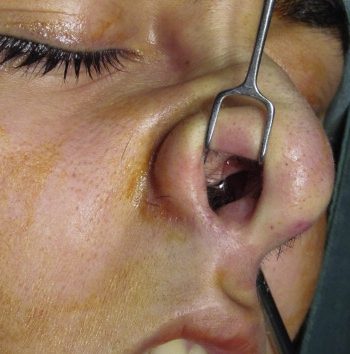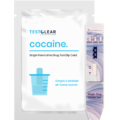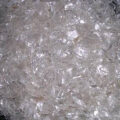Cocaine nose or “Coke nose” is a term commonly used to describe the physical effects that may occur as a result of cocaine use. When someone uses cocaine, it constricts blood vessels in the nasal passages, leading to reduced blood flow and potential damage to the tissues in the nose.
Repeated cocaine use can cause various nasal problems, including:
- Nasal congestion: Cocaine can cause the blood vessels in the nasal passages to become swollen and inflamed, leading to a stuffy or blocked nose.
- Runny nose: Cocaine use may result in excessive nasal discharge or a persistent runny nose, known as rhinorrhea.
- Nosebleeds: The constriction of blood vessels and damage to nasal tissues can increase the likelihood of nosebleeds, which may range from minor to severe.
- Perforated septum: Prolonged cocaine use can cause a perforation (hole) in the septum—the cartilage that separates the nostrils. This occurs due to reduced blood flow and direct damage to the tissues.
- Nasal infections: Chronic irritation and damage to the nasal passages can make individuals more susceptible to bacterial or fungal infections, leading to symptoms such as pain, swelling, and discharge.
It is important to note that the term “coke nose” primarily refers to the physical manifestations associated with cocaine use and does not encompass the broader range of health risks and consequences associated with drug abuse. Cocaine abuse can have severe health implications beyond nasal issues, affecting the cardiovascular system, mental health, and overall well-being. Here is some effects related to cocaine use:
- Short-term effects: Cocaine is a powerful stimulant drug that produces intense euphoria, increased energy, heightened alertness, and a sense of confidence. However, these effects are temporary and are often followed by negative consequences such as restlessness, irritability, anxiety, paranoia, and potentially dangerous cardiovascular effects like increased heart rate and blood pressure.
- Long-term effects: Chronic cocaine use can lead to various long-term health issues, including cardiovascular problems like heart attacks, strokes, and irregular heart rhythms. It can also cause respiratory problems, such as lung damage and respiratory distress. Additionally, prolonged cocaine use can have detrimental effects on mental health, including an increased risk of anxiety disorders, depression, and psychosis.
- Addiction: Cocaine is highly addictive, and repeated use can lead to dependence. Addiction to cocaine is characterized by a compulsion to use the drug despite negative consequences, loss of control over drug use, and withdrawal symptoms when attempting to quit. Cocaine addiction can severely impact a person’s personal relationships, work or academic performance, and overall quality of life.
What to do if you develop a coke nose
If you are experiencing nasal issues or suspect that you may have developed a “coke nose” due to cocaine use, it is important to take appropriate action. Here are some steps you can consider:
- Seek medical advice: It is advisable to consult a healthcare professional, such as a primary care physician or an ear, nose, and throat specialist (ENT), who can assess the extent of the damage and provide appropriate treatment recommendations. They can examine your nasal passages, evaluate any potential complications, and suggest the best course of action.
- Be honest with your healthcare provider: It is crucial to be open and honest about your cocaine use when discussing your symptoms with a medical professional. They are there to help you and provide appropriate care without judgment. Accurate information about your drug use will assist them in making an accurate diagnosis and developing an effective treatment plan.
- Follow medical advice and treatment: Depending on the severity of the nasal issues, your healthcare provider may recommend various treatment options. These can include medications to reduce inflammation, nasal sprays to alleviate congestion, or antibiotics if there are signs of infection. In more severe cases, surgery may be necessary to repair or reconstruct damaged nasal tissues.
- Stop using cocaine: Continuing to use cocaine will only worsen nasal problems and increase the risk of further damage. It is crucial to make a commitment to stop using cocaine to prevent additional harm to your health and well-being. Seeking support from addiction specialists, counselors, or support groups can greatly assist you in this process.
- Practice good nasal hygiene: In addition to medical treatment, taking care of your nasal passages can help promote healing and prevent further complications. This includes avoiding nasal irritants like cigarette smoke, keeping the nasal passages moist with saline nasal sprays or rinses, and avoiding excessive nose blowing or picking.
Remember, seeking professional medical advice is essential to address any health issues associated with cocaine use. Additionally, reaching out to addiction specialists or support groups can provide you with the necessary guidance, resources, and support to overcome addiction and maintain a healthier lifestyle.
How is coke nose treated?
The treatment of “coke nose” or nasal issues resulting from cocaine use depends on the severity and specific symptoms. Here are some common approaches to treating coke nose:
- Medications: Your healthcare provider may prescribe medications to address symptoms and promote healing. These can include:
- Decongestants: Oral or nasal decongestants can help reduce nasal congestion and improve breathing.
- Nasal corticosteroids: These medications can reduce inflammation in the nasal passages and help alleviate symptoms such as congestion, runny nose, and swelling.
- Antibiotics: If there is evidence of nasal infection, your healthcare provider may prescribe antibiotics to treat the infection.
- Nasal irrigation: Nasal rinses or saline sprays can help flush out irritants, reduce inflammation, and keep the nasal passages moist. These can be purchased over-the-counter or prescribed by your healthcare provider.
- Topical treatments: Your healthcare provider may recommend topical applications such as antibiotic ointments or nasal creams to address localized infections or promote the healing of damaged nasal tissues.
- Surgical intervention: In severe cases where there is significant damage to the nasal septum or other nasal structures, surgical intervention may be necessary. This can involve procedures like septoplasty (to repair or reconstruct the septum) or rhinoplasty (to correct cosmetic or functional issues in the nose).
- Substance abuse treatment: It is essential to address the underlying cocaine addiction to prevent further damage and promote overall well-being. Treatment options for substance abuse may include behavioral therapies, counseling, support groups, and in some cases, medications to manage cravings or withdrawal symptoms. Seeking assistance from addiction specialists or substance abuse treatment centers can provide comprehensive support.
It’s important to note that treatment approaches may vary based on individual circumstances and the extent of damage caused by cocaine use. It is recommended to consult with a healthcare professional, such as an ENT specialist or addiction specialist, who can assess your specific situation and provide personalized treatment recommendations.






